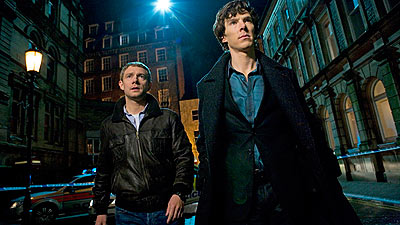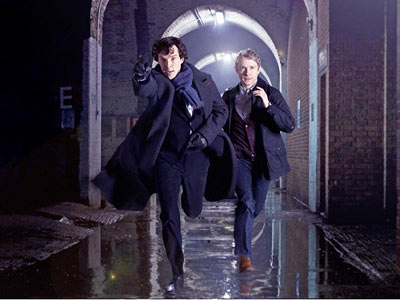Sherlock Holmes Has A Cell Phone
Published on January 30th, 2011 in: All You Need Is Now, Current Faves, Issues, TV |By Lisa Anderson
In Central London, Scotland Yard is holding a press conference about a recent spate of suicides. The Detective Inspector insists that the deceased must all have something in common, and instantly, everyone present—police and press alike—receives a text stating simply: “Wrong!” Later that week, an army doctor, just back from Afghanistan, is checking out a potential flat with the strange, misanthropic young man he met only the day before. The landlady asks how many bedrooms they’ll be needing, saying that it’s okay if it’s only one. “Of course we’ll be needing two!” the doctor protests, shocked.
Both of these scenes take place in Sherlock, a miniseries created by the BBC but which also aired on PBS’s Masterpiece Mystery. They also both illustrate the way this contemporary retelling brings Sir Arthur Conan Doyle’s detective into the modern world, with its ever-changing technology and complicated social realities.

Three 90-minute episodes have been made so far. In the first one, “A Study in Pink,” we meet John Watson, a physician and veteran. Through a mutual acquaintance, he finds an unlikely flatmate in Sherlock Holmes, the “world’s only consulting detective.” Watson gets dragged into Holmes’s latest case, a string of apparently related suicides. Along the way, Watson gets to know the people in Sherlock’s orbit, including Mycroft Holmes, Sherlock’s mysterious and influential older brother. They solve the mystery, but learn that Holmes’s accomplishments have attracted the attention of a powerful new enemy named Moriarty.
In the next episode, “The Blind Banker,” a coded message spray painted at various murder scenes leads Holmes and Watson to a Chinese smuggling gang. Watson also gets a new job and a new girlfriend, and both these changes, of course, are complicated by his informal role as the world’s only consulting sidekick. The third installment, “The Great Game,” starts off with Holmes and Watson getting into a tiff, only to come back together after a bomb shakes their 221 Baker Street home. That explosion is only the first in a chain of events, as Moriarty leads the pair on a sort of scavenger hunt, racing to retrace his crimes in order to prevent further bombings
At the end of “The Blind Banker,” we see that Moriarty is in league with the Chinese smuggling gang, too, as part of his vast web of illegal enterprise. As “The Great Game” concludes, the identity of this “consulting criminal” is revealed, in a masterful performance by the actor playing him. I warn you, though: this episode ends in a cliffhanger, and it leaves the lives of Holmes and Watson hanging in the balance. The story will be finished, but not before Martin Freeman, who plays Watson, is done playing Bilbo Baggins in Peter Jackson’s The Hobbit.
The casting in Sherlock is excellent. With his piercing grey eyes, curly dark hair, and deep voice (which at times sounds like Alan Rickman), Benedict Cumberbatch seems to have been born for the role of Sherlock. His Holmes is different from almost any other version. For one thing, he’s a much bigger jerk. A self-described “highly functioning sociopath,” he says outrageously condescending or otherwise inappropriate things, and sometimes uses his deductive talent to shock and embarrass people. He can be manipulative. He seems to be motivated not my any moral compass, but the desire to never be bored.

My only real problems with this Holmes had more to do with writing than with acting. In one scene, he doesn’t seem to have noticed that his housemate ducked out for hours for a job interview. This seems like a huge hole in those vaunted powers of observation. Also, it is revealed that Sherlock lacks certain basic knowledge, such as the arrangement of the solar system and the identity of Britain’s Prime Minister. While he chalks this up to leaving brain-space for observation, I’d argue that a certain foundation is required to make the right observations, or to interpret them.
Martin Freeman’s portrayal of Watson is almost note-perfect, although it stays on more familiar ground. His Watson is like Jude Law’s from the recent big-screen version in that he can be a formidable fighter when necessary. Mycroft correctly deduces that subconsciously, Watson misses being in the midst of battle . . . but as he points out, a less visible battle—against murderous evil—rages around him in the capital of his own country.
Watson, in his own way, is almost as isolated as Holmes, but by circumstances, not personality. This doesn’t make him some passive cheerleader, though. He is not afraid to get angry with Holmes, matching him barb-for-barb or reminding him that real lives are at stake (or already lost). As Mycroft observes in “A Study in Pink,” Sherlock is a great man . . . and with Watson’s help, might even become a good one.
Modern technology provides a backdrop to the series. Watson is a blogger rather than a novelist (which I consider a wonderful change). Holmes texts constantly, and other gadgets—from GPS to grocery-market scanners—make guest appearances. The real challenge for Holmes and Watson, though, is not to use GPS, but to locate where they are in relation to each other. This is a theme throughout all three episodes. Early on, Holmes misinterprets Watson’s probing questions about his personal life as romantic interest, and is quick to say that he’s flattered, but not interested. In another episode, Holmes introduces Watson as his friend and Watson—irritated from an earlier fight—corrects him, saying “colleague.” He’s told repeatedly that Sherlock “doesn’t have friends.”
Without giving away too much, toward the end of “The Great Game”, Holmes saves Watson’s life (mirroring an event from “A Study in Pink”). A rattled Watson jokes that he’s glad no one can see them at the moment, because they’d “get the wrong idea.” This highlights the central question of Sherlock: not, all kidding and subtext aside, whether they will become a couple . . . but whether they will become friends. In the battlefield of London, it’s going to take more than cold professionalism, or the casual bond of housemates, to keep them both alive.
One Response to “Sherlock Holmes Has A Cell Phone”
February 3rd, 2011 at 11:42 am
Lovely review. I adored this program.
For clarity’s sake, my nerd’s heart forces me to speak up.
Holmes, as portrayed in A Study in Scarlet, Doyle’s first Sherlock Holmes story, is indeed said to not know, nor care, that the Earth revolves around the sun. That bit of writing was actually a loving tribute to the source.
http://www.literature.org/authors/doyle-arthur-conan/study-in-scarlet/part-01/chapter-02.html
“I’d argue that a certain foundation is required to make the right observations, or to interpret them.”
And by episode’s end you’re proven to be correct, as knowledge of the solar system would have led Sherlock to the solution much more quickly. He is, indeed, a bit humbled by the lapse, and Watson gloats of it.
Holmes in the Doyle stories starts off callous and distant, “a high functioning sociopath,” if you will, and one who is singularly obsessed with his work. Through his friendship with Watson, he becomes a much more whole and decent person. It’s really a rather extraordinary dramatic arc, and one which Gatiss and Moffat seem to be using as central to their program.
Time limit is exhausted. Please reload the CAPTCHA.